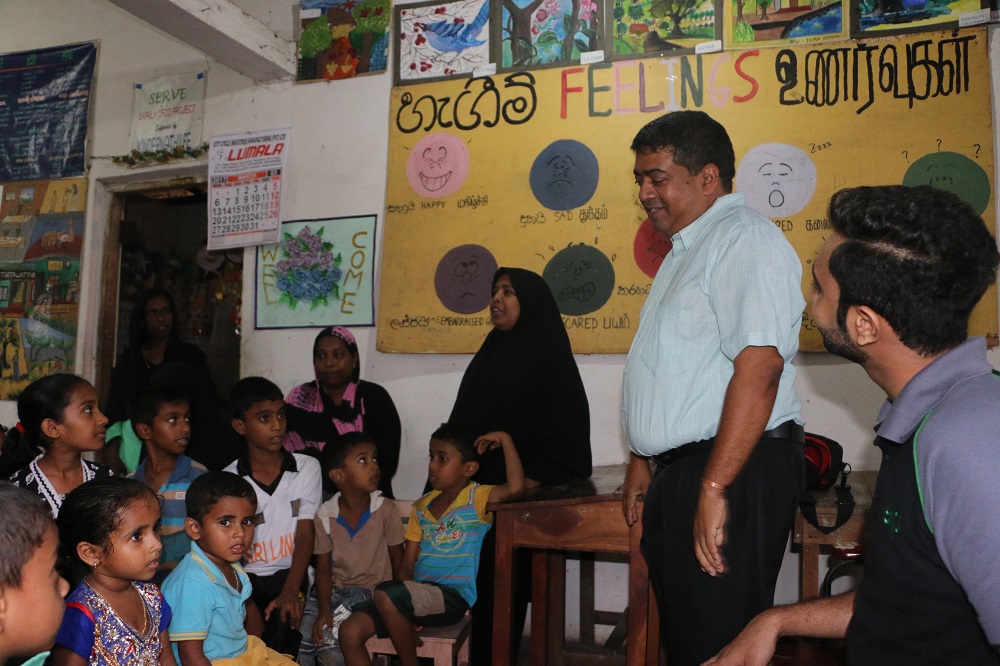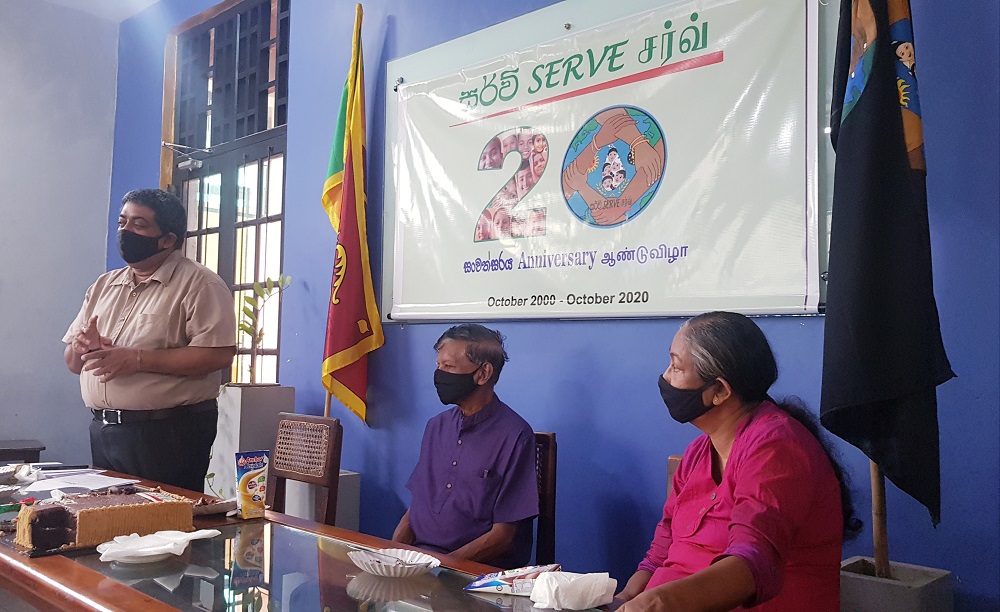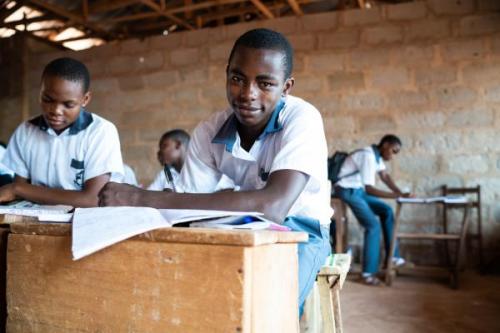
When Sanjeeva de Mel began studying social work, he tried something uncommon in Sri Lanka at that time: working in schools. By the age of 27, he had become the first school-based social worker in the country – and in the decades since, de Mel has left a lasting positive mark on communities, caregivers and children throughout Sri Lanka.
From supporting child sexual abuse cases as a social work student to founding SERVE, a Sri Lankan non-profit organization, de Mel has worked to embed social work and its practices programmes for children, with a particular focus on girls and the most vulnerable. While leading SERVE, de Mel also became the Country Representative of a United Kingdom-based non-profit called Hope for Children, where he strengthened a programme to support and protect girls and boys living on the street, and created new programmes to help children of HIV patients, physically and mentally disabled children, and other vulnerable groups.
As the fourth End Violence Champion, de Mel shared his experiences in the social work and non-profit field, and explored how to truly end violence against children – once and for all.
How did you become interested in child protection?
I grew up in Moratuwa, a densely populated, multi-ethnic and religious coastal town south of Colombo city in Sri Lanka. Moratuwa is known for carpentry, fishing and trading. My sense of social responsibility came from my Anglican Christian background.
Since my early teens, I have grown more and more conscious that we should not just be living for ourselves – but for others as well. My religious background also opened me up to others’ suffering; though I had so much support as a child, I knew that many others in my community did not. Though my parents didn’t use corporal punishment, it was a widespread practice in both the home and the school. Spanking, caning and hitting were used by many as tools to “put children right.”
Since my early teens, I have grown more and more conscious that we should not just be living for ourselves – but for others as well.
I knew that there was more happening too, like children being subject to dangerous emotional abuse, sex trafficking, child labour and commercial sexual exploitation within the tourism industry. To address these issues, at church, we began a programme to provide children from vulnerable communities with a safe space to play, learn and have fun.
From then on, I continued working with children, at first teaching in Sunday school, then at a non-governmental organisation, and then as a professional social worker.
Tell us about your journey to becoming a social worker in Sri Lanka.
After working at an NGO for four years, I went back to complete my bachelor’s degree and entered the National Institute of Social Development, Sri Lanka, to obtain my diploma in the field of social work. I wanted to try something different, so I focused on school-based social work, which wasn’t very common at the time. Part of this course required an eight-month field placement – and to fulfil that requirement, I went back to the school where I completed my secondary education, S Thomas’ College, an all-boys school south of Colombo.
During this time, I continued to see the challenges children were facing. I intervened when a student known to me stopped going to school. I found out that the child had been abused by a neighbour and had emotionally shut down after the incident – he didn’t want to attend school or be with people. He was very uneasy and wanted to be away from the community. On top of that, his parents were struggling to pay his school fees and school-related expenses.
I managed to arrange a scholarship to cover his fees and personally accompanied him to school. He also went through counselling by me. He finished his education, and today, he is happily married with children and well employed. I understood the need for school social work in Sri Lanka through this first-hand experience.
After completing my field placement, the school hired me to become a full-time school-based social worker. This was the very first time a social worker was hired to help students. I was only 27 and was happy that I had managed to do something different, something good, and something positive for my school and community.
What did you do as a school-based social worker?
At this time, the school system in Sri Lanka promoted a movement against corporal punishment. During our days, there was caning, hitting, slapping, kneeling…it was all part of the correction methods placed on us by teachers and often, by parents. Together with the school management, we began educating teachers about the negative impact of corporal punishment.
Also, at that time – it was 2002 – it was very difficult for a parent or child to contact the school. Mobile phones were still used mainly for commercial purposes in Sri Lanka, and if the parents called the school’s landline, they couldn’t reach a social worker or student counsellor after school hours or on holidays.
In response, we started a phone line for parents and students to contact us in a more efficient manner, and that became the first privately created helpline by a school. I still manage the helpline 20 years later, but now, we have a team of counsellors to help.
Tell me about SERVE. Why did you found it, and what does the organisation do?
I remained full-time at the school for four years, though eventually, I embarked on a new journey to found SERVE, a Sri Lankan non-profit, of which I am now the Executive Director. My vision was to start something of our own to help children that used a locally acceptable mechanism and incorporated knowledge from other parts of the world.
At SERVE, we aim to address the pressing protection issues that Sri Lankan children were facing, such as increased abuse cases, school dropouts and attendance problems, emotional and psychological issues, child labour, and drug use, among others. At the time of SERVE’s founding, children experienced these things against a background of a violent, continued war in the country.
My vision was to start something of our own to help children that used a locally acceptable mechanism and incorporated knowledge from other parts of the world.
Ever since, we’ve worked in 30 different schools to support school-based social workers and help them support children within the school structure. We set up resource centres outside schools for after-school and holiday activities. We also worked with schools to promote non-violent education. While doing that, we focused on holistic education and managed to make people understand that violence is not the way to correct children’s behaviours.
At present, we have the three main service-delivery programmes at SERVE. The first is child-focused community-based programming, which utilises social workers for guidance and counselling. Through this programme, we facilitate children’s clubs, awareness programmes and mother empowerment through self-help groups. Through the My Body is My Body Programme, we have also used cartoon-based education to protect children from abuse, including sexual abuse. The second is girls’ empowerment programmes, which use sports-based activities like karate and netball to give children a safe space to play, learn and grow. The third is a programme to support women and children in prison, which we implement by establishing and running two preschools in Colombo and Kalurata prisons. In this programme, we also provide nutritional snacks, clothing, toiletries and other items to make the environment more child friendly.
In each of these areas, we promote evidence-based social work field practices and provide mentorship to local and international social work students helping children. We have over 25 staff members who do this work, and over the years, we have served over 100,000 individuals in over 20 districts.

How has your work changed as a result of COVID-19?
I live and work in a location where COVID-19 is highly prevalent. Earlier this year, we went into a strict lockdown for three months; we needed special permission from the police to get curfew passes to reach our beneficiaries. Our work changed to prioritise more immediate needs, and we managed to help more than 1,000 families secure food for two or more weeks.
Even amidst many challenges, we continue to help children and mothers living in Sri Lankan prions. We introduced a new online payment gateway to get them the financial assistance they needed. We had five staff members coordinate this work on the ground. It was challenging, but we stayed committed to our community and doing what we could.
As for our regular work in communities and schools, we are not allowed to bring children together for any group activity. But we can help children on a one-on-one basis. Although it has been difficult, social workers are continuing to visit communities in safe ways.
What do you think needs to happen if we are to end violence against children for good?
The main thing is adults should not practice violence to achieve their goals. Children follow adults, and they mainly follow what adults do, rather than what they say. People at all levels should not be promoting violence or using violent methods to achieve any goal. But to do this, teachers need support – they need to learn how to teach students without using physical or emotional violence in the classroom. The same goes with parents, community leaders, and other stakeholders.
The government, non-profit, and private sectors (through their corporate social responsibility projects) should also provide more resources and prioritise holistic development of children, including combatting violence against children.
If we don’t do all of this, we will continue the cycle of violence from this generation to the next.
ABOUT END VIOLENCE CHAMPIONS
As part of the Together to #ENDviolence global campaign, we are celebrating these individuals and the change they are helping to create. Through Q&A-style interviews, you will learn from practitioners, activists, researchers, policymakers and children about their successes, their challenges, and what they think is needed to end violence for good. Every month, we will feature someone working on this challenge from a different part of the world, shedding light on their impact and the efforts of their affiliated organisation, company or institution.
Do you know someone who should be featured as an End Violence Champion? Nominate them here!

